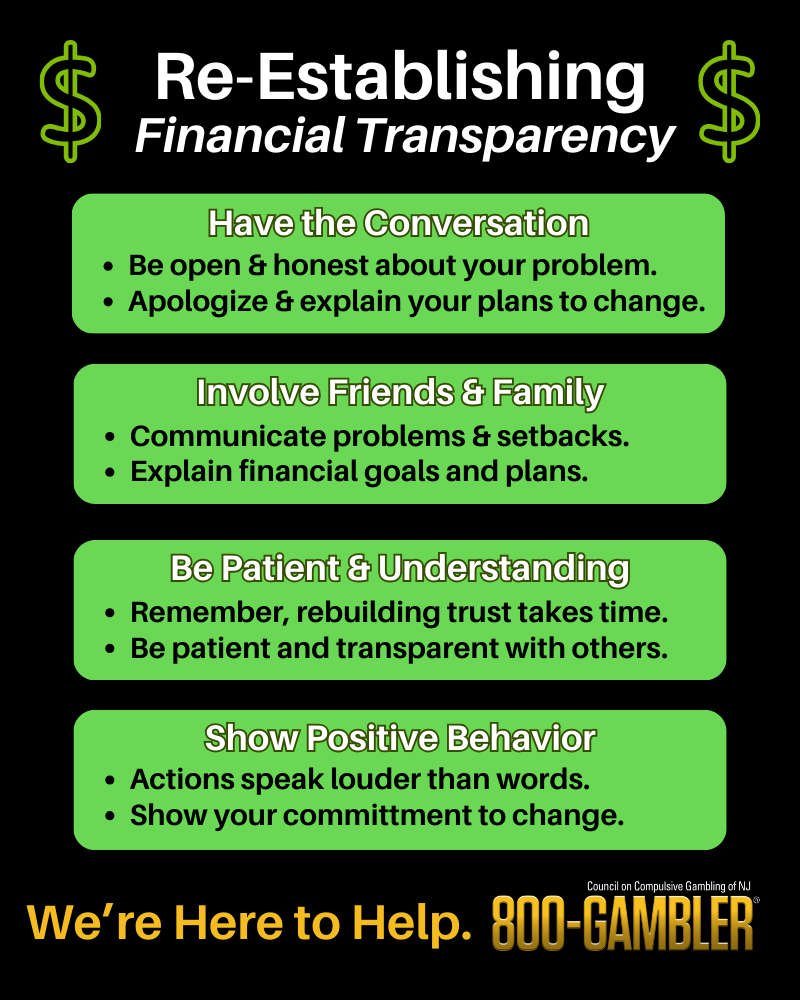Beyond winning the big jackpot or losing it all, participating in online or in-person gambling can have another, far more impactful outcome on some individuals: the development of a gambling problem. Excessive or harmful gambling behaviors can have a long-lasting impact on your mental and physical health as well as your financial stability, so a multifaceted treatment approach is crucial to handling this issue.
While not discussed as often as mental and physical well-being, rebuilding financial transparency is an essential part of regaining control and fostering a healthier financial future for problem gamblers. This guide provides practical steps to help problem gamblers address their financial issues, rebuild trust, and work toward stability. Read on to find out what you need to know, or get in touch with 800-GAMBLER’s toll-free and confidential helpline today to get help!
Acknowledge the Problem
The beginning of any recovery journey is acknowledgment. Facing the reality of problem gambling’s impact on your finances is a powerful first step. It involves a deep, introspective look at the consequences of gambling behavior on personal and financial well-being. This self-awareness serves as the foundation for meaningful change.
Remember that acknowledging your gambling problem is not a sign of weakness but a courageous act that opens the door to recovery. It sets the stage for a proactive and intentional approach to rebuilding financial transparency.
Seek Out Help & Healing
Professional help is instrumental in untangling the complex web of problem gambling, whether your vice is sports betting apps, courtsiding, slot machines, or anything else. Enrolling in a reputable treatment program, beginning work with a therapist, or joining a support group (such as Gamblers Anonymous Zoom meetings) offers a structured and supportive environment to address the root causes of your gambling issues. These treatment programs may include a range of therapeutic interventions, including counseling, cognitive-behavioral therapy, and more. The goal is not just to curb the immediate symptoms and provide emotional support but to equip you with coping mechanisms, resilience, and a deeper understanding of your relationship with gambling.
Develop a Budget & Establish Milestones
Once you are on the path to recovery and have developed strategies to cut back or stop gambling, it’s time to take control of your finances through the creation of a realistic budget. This comprehensive financial plan involves a meticulous examination of income, expenses, and existing debts. Identifying discretionary spending, prioritizing essential expenses, and allocating funds toward debt repayment are key elements of budgeting. Working with a financial counselor can be an invaluable tool during this process.
Building on the foundation of a budget, the next crucial step is setting clear and achievable financial goals. These goals act as milestones, providing a sense of direction and purpose. Whether it’s clearing outstanding debts, building an emergency fund, or saving for future expenses, having tangible objectives creates motivation and focus.
Improve Financial Literacy
By acquiring more financial knowledge, problem gamblers can equip themselves with the tools needed for sustained financial well-being. Engaging in ongoing financial education enhances your financial literacy, empowering you to make informed decisions about budgeting, saving, investing, and debt management. Numerous resources, including online courses, workshops, and community programs, offer valuable insights into building a solid financial foundation.
Re-Establish Trust
Whether you’re single and living alone or have a family to support, problem gambling can lead to many different types of relationship problems. Rebuilding trust with your loved ones is a delicate yet essential component of the problem gambling recovery process. Re-establishing trust can be a slow process, but it is vital to healing your relationships with others. Here’s what to keep in mind as you work on rebuilding trust:

Have the Conversation
Begin by initiating honest conversations with your loved ones. This involves candidly sharing your commitment to financial recovery and addressing the impact of your preoccupation with gambling on both your personal and family life. Transparency at this stage sets the tone for rebuilding trust.
If your gambling behavior has caused harm, making a sincere apology is another important step. Acknowledge the pain and stress that your actions have caused and show that you understand how your problem gambling affects the family. Alongside the apology, take concrete actions to make amends and demonstrate your commitment to positive change.
Involve Them In the Process
Keep the lines of communication open by regularly discussing your progress and setbacks. Sharing the steps you’re taking to address gambling-related issues and demonstrating a willingness to learn from challenges builds credibility and reassures loved ones of your commitment to change.
Also, make sure to clearly communicate your financial goals with your family members or partner. Whether it’s paying off debts, building savings, or planning for the future, sharing these objectives fosters a sense of shared purpose. It allows your loved ones to understand the positive direction in which you are steering your financial life.
In some circumstances, you may also want to involve certain loved ones in your financial decisions. This collaborative approach not only showcases your newfound responsibility but also demonstrates that you value their input. It’s a tangible way to rebuild trust and financial transparency within the family unit.
Be Patient and Understanding
Rebuilding trust is a gradual process, and patience is key. Rather than becoming restless or irritable when attempting to communicate, try to understand that your loved ones may need time to fully trust that positive changes are taking place. Demonstrating consistency in your actions, coupled with an understanding attitude, goes a long way in nurturing the rebuilding process.
Show Consistent Positive Behavior
Actions speak louder than words. Consistently demonstrating positive financial behavior and responsible decision-making reinforces your commitment to change. This consistency builds a foundation of trust over time, showing your loved ones that you are actively working towards a more secure and transparent financial future.
Work Towards a Better Future!
The journey towards rebuilding financial transparency for problem gamblers is a comprehensive and transformative process that is unique for each individual. By integrating these practical steps into their lives and staying committed to the process, problem gamblers can achieve not only financial recovery but also a renewed sense of control and fulfillment. The path may have its challenges, but with perseverance, support, and a proactive mindset, a brighter financial future awaits.
If you or a loved one is struggling with a gambling problem, 800-GAMBLER is here to help. Our toll-free, confidential problem gambling helpline is available 24/7 to connect you to the resources you need to regain control over your life. Take the first step today and give us a call — we’re waiting to hear from you.



